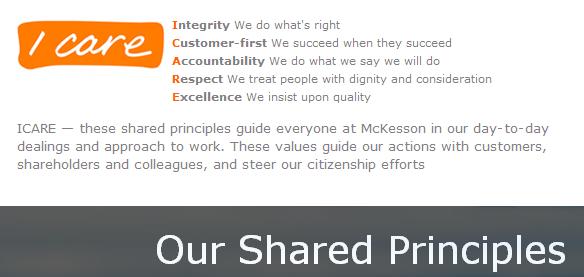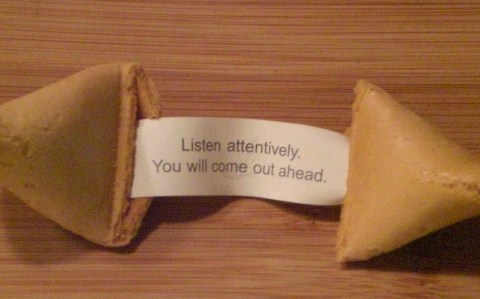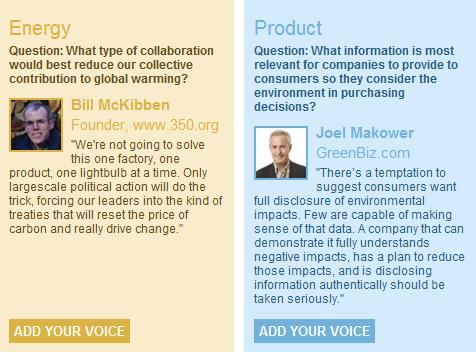 Recently I had the opportunity to interview Marcus Chung, director of corporate citizenship at McKesson (To learn more about Marcus, check out his blog and follow him on Twitter).
Recently I had the opportunity to interview Marcus Chung, director of corporate citizenship at McKesson (To learn more about Marcus, check out his blog and follow him on Twitter).
My purpose for sitting down with Marcus was twofold. First, I wanted to get his take on corporate social responsibility and sustainability efforts at McKesson, as well as ask some questions about the field in general. Second, given that he is a young CSR leader, I wanted to give Marcus a chance to share his own personal story.
Over the course of an hour or so, we talked about:
- Marcus' Professional Background,
- Corporate Citizenship at McKesson,
- Culture and CSR Success
- Reporting on Impact, and
- CSR Going Forward.
It’s a long post, but well worth it! Here's what he had to say:
Marcus' Professional Background
After graduating from Wesleyan University, Marcus worked as a senior research manager at The Corporate Executive Board. While he enjoyed working in the private sector, Marcus felt like he was missing something. It turns out that “something” was a discussion of the social and environmental impacts of business – a realization that led him to enroll in UC Berkeley’s Haas School of Business.
While at Haas, Marcus interned at Net Impact, an experience that was crucial in deepening his understanding of the field of CSR. Throughout his internship Marcus conducted numerous informational interviews with other CSR professionals, who confirmed for him that no two CSR jobs are the same (a key takeaway for anyone looking to find their own CSR job!).
After completing his MBA, Marcus accepted another internship at Gap, Inc. which later turned into a full-time job. His role there focused on strategic planning and communications for the company’s CSR department. In this position he was able to observe how the many different aspects of Gap's CSR program – from ethical sourcing to environmental affairs to the Foundation – all reinforced Gap's key business goals.
In July 2008, Marcus left Gap, Inc. to become director of corporate citizenship for the environment at McKesson. As we’ll hear throughout my conversation with Marcus, this new role challenges him to be entrepreneurial, think strategically, build empowered partnerships, and act as a constant champion for corporate social responsibility.
Corporate Citizenship at McKesson
Headquartered in San Francisco, McKesson is a 176 year-old company that employs 32,000 people and last year had revenues of $106B. As a business-to-business company, McKesson’s two main divisions – distribution services and health care IT solutions – serve business customers like Wal-Mart, Target, and 70% of the nation’s hospitals. While many consumers may not be familiar with the McKesson name, it’s safe to say that we’ve all used or been in contact with McKesson’s products and services at some point in time.
Recently McKesson has experienced very rapid growth, which has mainly been fueled by acquisition; in fact, the company is actually made up of 40+ independent business units, each with its own degree of autonomy. This has interesting implications for McKesson’s corporate citizenship program because, at the corporate level, Marcus and the rest of the team are trying to create company-wide CSR standards. Yet when each business unit operates independently, it can be tough to create a cohesive program.
McKesson's Corporate Citizenship Program takes many different forms. In his role, Marcus reports to the vice president of corporate citizenship, who is also the president of the McKesson Foundation. He splits his time in a few different ways:
- Managing the Environmental Councils: While Marcus directs enterprise-wide environmental strategy for McKesson, he also manages a system to empower different business units and facilities to get involved through the development of environmental councils. Right now there are 17 councils throughout the McKesson network, each staffed by employee volunteers (between 3 and 30 people) who look for location-specific projects to reduce the company’s impact.
- Producing the Corporate Citizenship Report: If you haven’t checked out McKesson’s CSR report, I highly recommend it. While Marcus is the first to admit that McKesson is still wrapping its arms around its environmental impact, I was very impressed by the report and its ability to tell the human side of McKesson’s story.
- Engaging with Internal and External Stakeholders: Whether it’s partnering with vendors, responding to inquiries from the socially responsible investment community, or working with internal groups to champion McKesson’s corporate citizenship program, Marcus spends a lot of time in stakeholder relations. Interestingly, one of the company’s biggest stakeholder communities is real estate – since 50% of McKesson’s greenhouse gas emissions comes from its physical buildings, Marcus sees a huge opportunity to work with McKesson’s real estate constituents to improve the company’s environmental performance.
Culture and CSR Success
One of the questions I often ask CSR professionals is “What is it about your company’s culture that makes your CSR program successful?” There’s clearly a unique recipe for CSR success at each company, and my sense is that culture has a lot to do with it.
Marcus says McKesson's corporate citizenship is a work in progress, and that the company is still trying to get a full picture of its impact. That said, he believes that the company’s culture and commitment to corporate citizenship enables his team to better visualize what the company’s success will look like down the road.
One of the main examples of McKesson’s culture is what is known as the ICARE Shared Principles. These principles are meant to set the tone for all employee behavior and decisions. Yet according to Marcus, they are not just some funny corporate mantra that no one cares really about; instead these principles are truly internalized by employees as a set of values that everyone should follow. 
Take this and combine it with a CEO who believes in the importance of corporate citizenship and environmental sustainability, and you have a company that clearly values the right things.
Still, any CSR director knows that changing mindsets and behavior is a slow process. At McKesson, Marcus spends a lot of time educating employees that corporate citizenship goes beyond employee volunteerism and philanthropy.
“It’s an evolution,” Marcus said, “but at least there’s an appreciation for what we do.”
Reporting on Impact
Having just finished a post on The Basics of CSR Reporting, I was eager to get Marcus’ thoughts on how the Global Reporting Initiative’s guidelines factored into McKesson’s reporting strategy. Given that he had written reports at Gap, Inc. and is now doing the same for McKesson, Marcus had some interesting insights.
In general, he felt that using the GRI was a bit of a double-edged sword. On the one hand, the GRI clearly validates any company’s reporting efforts while also pushing it to improve its measurement process every year. Still, Marcus struggled with the idea of trying to fit McKesson’s data collection and reporting process into the rigid GRI categories, stressing that the company does not yet have a lot of the tools in place to measure what the GRI wants (not to mention the fact that some of what the GRI asks for isn't even relevant to McKesson's business).
Beyond the GRI, reporting at McKesson is still a challenge, Marcus said, because as a B2B company it’s not really used to disclosing this kind of information to various audiences (versus a company like Gap where today many end-consumers demand these details).
Not only is it difficult to collect data, then, but the company has to be comfortable with the story that the data tells – a concept that internal groups like marketing and legal might not always applaud. Thus, “reporting is an iterative process” at McKesson – and everywhere else I’m sure!
CSR Going Forward
Our interview concluded with a few final questions about the future of CSR at McKesson and in general. For Marcus, the key to McKesson's success is leveraging the enthusiasm and interest of its employees who clearly want to be involved in these initiatives. He wondered, “How do we connect them, get them educated and involved?”
He also said it’s time for the company to “start putting a stake in the ground” and set goals for measuring and reducing its environmental impacts. That is, rather than always looking backwards to tell stories and report results, Marcus wants the company’s focus to shift toward being pro-active about where McKesson will head in years to come.
As for the field overall, Marcus believes CSR is only going to grow in importance as more companies see the value of getting involved (and feel pressure from their stakeholders).
The big question, however, is how well – and how quickly – companies will realize that CSR goes beyond public relations and becomes instead about a deeper connection with, and impact in, communities worldwide.
Thanks, Marcus, for sharing your thoughts and opinions with The Changebase, and good luck at McKesson!
 I wrote a post last week on The Changebase that seems to have hit home for some readers.
I wrote a post last week on The Changebase that seems to have hit home for some readers.




